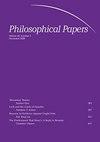和一个浪漫的伴侣生一个孩子有什么可取之处?
IF 1.3
3区 哲学
0 PHILOSOPHY
引用次数: 0
摘要
摘要大多数人都希望有一段浪漫的关系,大多数人都想有一个孩子。这篇论文提出了一个方面,在这个方面,更希望和一个浪漫的伴侣生孩子,而不是像柏拉图式的父母那样和一个不是浪漫伴侣的人生孩子。第一个前提是,浪漫关系,而且只有这种关系,有一定的欲望作为组成部分。这是一种尽可能与某人建立关系的愿望。这种“对关系的渴望”是浪漫关系的组成部分,这解释了为什么那些与浪漫关系有关的人往往会以其他方式建立关系,也解释了为什么浪漫伴侣往往希望与他们的浪漫伴侣建立关系。第二个前提是,通过有一个孩子在一起,浪漫的伴侣会以一种重要而独特的方式建立联系,满足他们对关系的渴望。由于柏拉图式的父母不希望彼此有关系,所以他们在一起生孩子并不能满足这种愿望。简要回顾了柏拉图式育儿的社会学文献,并回答了八个反对意见。本文章由计算机程序翻译,如有差异,请以英文原文为准。
What is Desirable About Having a Child with a Romantic Partner?
Abstract Most people desire to have a romantic relationship, and most people desire to have a child. The paper suggests one respect in which it is more desirable to have a child with a romantic partner rather than with someone other than a romantic partner, as platonic parents do. The first premise claims that the romantic relationship, and only this relationship, has a certain desire as a constitutive part. This is the desire to be as related to someone as one can be. That this ‘desire for relatedness’ is a constitutive part of the romantic relationship explains why those related by a romantic relationship tend to become related in other ways and explains why romantic partners tend to desire to have relationships with those to whom their romantic partner is otherwise related. The second premise is that by having a child together romantic partners become related in an important and unique way, satisfying their desire for relatedness. Since platonic parents do not have the desire for relatedness toward one another they do not satisfy such a desire in having a child together. A brief review of the sociological literature on platonic parenting is included and eight objections are answered.
求助全文
通过发布文献求助,成功后即可免费获取论文全文。
去求助
来源期刊

Philosophical Papers
PHILOSOPHY-
CiteScore
2.10
自引率
0.00%
发文量
18
期刊介绍:
Philosophical Papers is an international, generalist journal of philosophy edited in South Africa Original Articles: Articles appearing in regular issues are original, high-quality, and stand-alone, and are written for the general professional philosopher. Submissions are welcome in any area of philosophy and undergo a process of peer review based on initial editor screening and refereeing by (usually) two referees. Special Issues: Topic-based special issues are comprised of both invited and submitted papers selected by guest editors. Recent special issues have included ''Philosophy''s Therapeutic Potential'' (2014, editor Dylan Futter); ''Aging and the Elderly'' (2012, editors Tom Martin and Samantha Vice); ''The Problem of the Criterion'' (2011, editor Mark Nelson); ''Retributive Emotions'' (2010, editor Lucy Allais); ‘Rape and its Meaning/s’ (2009, editor Louise du Toit). Calls for papers for upcoming special issues can be found here. Ideas for future special issues are welcome.
 求助内容:
求助内容: 应助结果提醒方式:
应助结果提醒方式:


